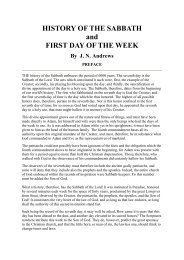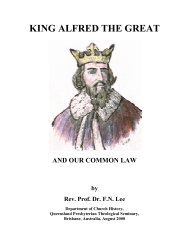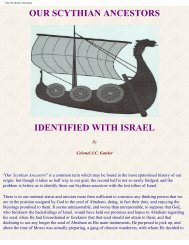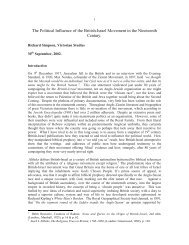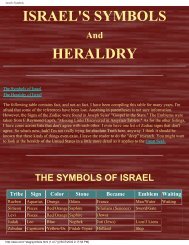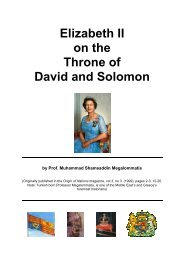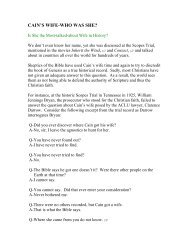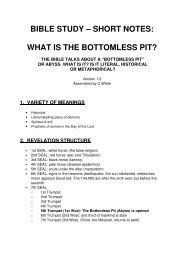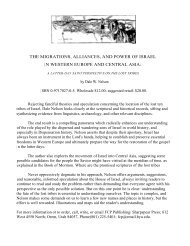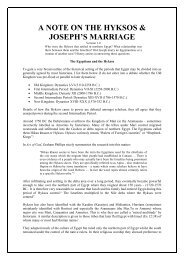The Throne of Britain: Its Biblical Origin and Future - Origin of Nations
The Throne of Britain: Its Biblical Origin and Future - Origin of Nations
The Throne of Britain: Its Biblical Origin and Future - Origin of Nations
You also want an ePaper? Increase the reach of your titles
YUMPU automatically turns print PDFs into web optimized ePapers that Google loves.
themselves as Danaans—a name evidently derived from the Israelite tribe <strong>of</strong> Dan (see Appendix 2:<br />
“Were the Greeks Israelites”).<br />
Indeed, a number <strong>of</strong> the Greek mercenaries employed in Egyptian service were probably Israelites<br />
whose ancestors had earlier settled in Greece <strong>and</strong> neighboring l<strong>and</strong>s. And here they were—guarding<br />
the remnant <strong>of</strong> the Davidic royal family under orders <strong>of</strong> the Egyptian pharaoh!<br />
Yet this arrangement was not to last. “<strong>The</strong> Greeks continued to play a prominent role during the<br />
reigns <strong>of</strong> Psammeticus II <strong>and</strong> Apries (the Pharaoh Hophra <strong>of</strong> Jeremiah). Under the latter, however, a<br />
national movement among the Egyptians led to a revolt [ca. 570 B.C.] against the [Egyptian] king<br />
<strong>and</strong> the Greek element, with the result that the throne passed to the general Amasis (Ahmosis II),<br />
who withdrew the Greeks from Daphnai” (Chamber’s Encyclopedia, 1959, Vol. 5)—evidently<br />
expelling many <strong>of</strong> them whom he considered loyal to Hophra.<br />
Adding to the need for expulsion was the fact that although Ahmose confined the remaining<br />
Greek mercenaries near his capital, making many <strong>of</strong> them part <strong>of</strong> a royal guard, “an element within<br />
Egyptian culture . . . resisted this; <strong>and</strong> the presence <strong>of</strong> foreigners in Egypt, both as invaders <strong>and</strong><br />
settlers, led to the rise <strong>of</strong> a nationalism” that wanted the foreigners out (“Egypt,” Encyclopaedia<br />
Britannica, Macropaedia, Vol. 18, 1985, p. 165; “Ahmose II,” Micropaedia, Vol. 1, p. 168).<br />
It was now about 16 years after the fall <strong>of</strong> Jerusalem, <strong>and</strong> up to this point things had apparently<br />
gone rather well in Egypt for those who had fled there. But God had warned <strong>of</strong> the calamity to befall<br />
Hophra (Jeremiah 44:30). And He had warned the Jewish remnant seeking refuge in Egypt that they<br />
would be consumed there (verse 27). Clearly, then, the turn <strong>of</strong> events was from Him. <strong>The</strong> Egyptians<br />
drove many <strong>of</strong> the Greco-Israelite mercenaries from the country. And most <strong>of</strong> the Jewish remnant<br />
was probably slaughtered around this time, if not in the uprising then probably in Nebuchadnezzar’s<br />
invasion <strong>of</strong> Egypt two years later in 568 B.C., which laid waste most <strong>of</strong> the Nile valley.<br />
Based on God’s prophecies, a few evidently made it back to Judah (verse 28). But what about<br />
Jeremiah, Baruch <strong>and</strong> the kings daughters Where did they go <strong>The</strong> book <strong>of</strong> Jeremiah doesn’t actually<br />
tell us, although it contains some hints.<br />
To be planted in Israel<br />
<strong>The</strong> very fact that Jeremiah was outside the country in the company <strong>of</strong> the king’s daughters, the<br />
only apparent successors to the Davidic throne, with a commission “to build <strong>and</strong> to plant” should<br />
give us pause. This was no mere coincidence—especially when we consider the unbreakable covenant<br />
God had made with David.<br />
God had even said that if the Jewish remnant stayed in Judah as He told them to, He would have<br />
used Jeremiah to replant <strong>and</strong> build up the kingdom right where they were (Jeremiah 42:10). But, as<br />
we’ve seen, they instead went to Egypt—where God had explicitly said not to go.<br />
So now that they were being driven out <strong>of</strong> Egypt, where would Jeremiah go at this time with the<br />
king’s daughters <strong>The</strong>y weren’t supposed to be where they were. And indeed, it is quite possible that<br />
they had already left Egypt even prior to Hophra’s death. In either case, to where did they travel<br />
No longer would God rebuild the kingdom in Judah—as the people had violated the terms <strong>of</strong> this<br />
<strong>of</strong>fer by fleeing to Egypt.<br />
Moreover, Judah or any other l<strong>and</strong> under Babylonian dominion would seem a highly unlikely<br />
choice. If Nebuchadnezzar had not known about the king’s daughters before, he certainly did now.<br />
News undoubtedly reached him <strong>of</strong> their being placed under special guard <strong>and</strong> care by his enemy,<br />
Pharaoh Hophra. And even Jeremiah himself, who had previously been accorded favor by the<br />
Babylonian invaders <strong>of</strong> Jerusalem, would now be mistakenly perceived as an accomplice <strong>of</strong> Hophra.<br />
Furthermore, we know the throne was not replanted in Judah because the Bible gives us<br />
information about the Jewish homel<strong>and</strong> during the time <strong>of</strong> the captivity. And when the captives later<br />
return from Babylon, it is obvious that there is no Jewish king reigning over anyone there. Thus,<br />
while Jeremiah <strong>and</strong> the royal daughters may have briefly passed through Judah at this time, they did<br />
not resettle there.<br />
So did they hide out in a cave in obscurity for the rest <strong>of</strong> their lives Or, more reasonably, did<br />
they settle down somewhere with their important status acknowledged by others And if so, was it<br />
somewhere that the prophet could fulfill his commission<br />
Jeremiah himself provides us with a powerful clue. He had earlier prophesied that from his time<br />
forward, David would “never lack a man [i.e., a person] to sit on the throne <strong>of</strong> the house <strong>of</strong> Israel”<br />
(Jeremiah 33:17). This verse is crucial to underst<strong>and</strong>ing the whole subject. Read it again. Notice—it<br />
- 7 -



